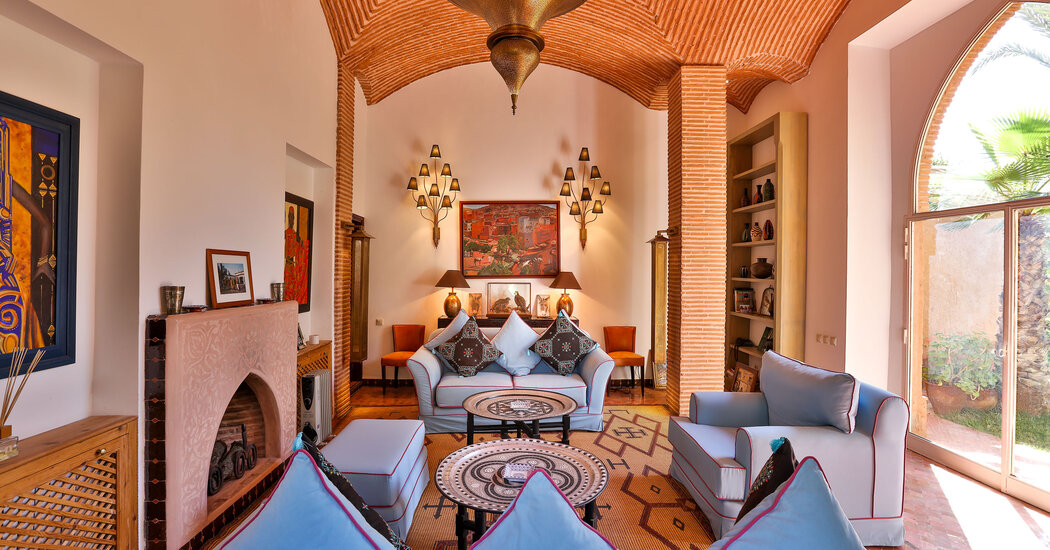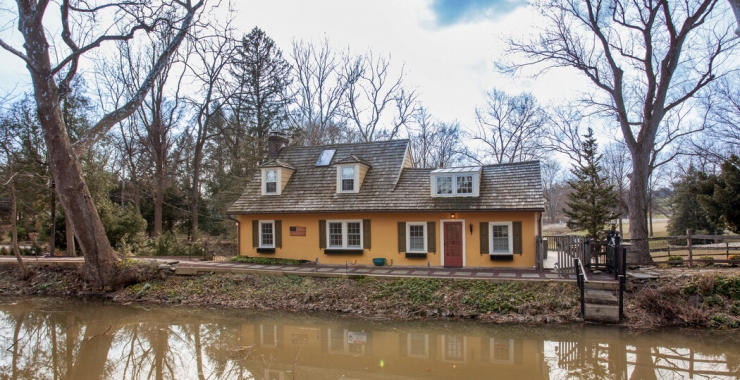House Hunting in Morocco: A Modern Riad-Style House Outside Marrakesh
A Six-Bedroom House Outside Marrakesh
$2.51 MILLION (26 MILLION MOROCCAN DIRHAM)
This Moorish-style, six-bedroom home sits on two gated acres in the Palmeraie, a 54-square-mile palm grove on the outskirts of Marrakesh, in western Morocco.
The expanded 7,535-square-foot house, as well as an adjacent tower-style guesthouse, are styled in the salmon-pink hue that lent Marrakesh its moniker as the “red city,” derived from the clay used for its ramparts and buildings going back to the 12th century.
The original house, built in 1995 by the award-winning architect Elie Mouyal, had the charm of a traditional Moroccan riad, with small rooms off courtyards and walls finished using Tadelakt, a seamless surfacing technique, said Mehdi Amar, associate director of Barnes International Realty Marrakesh. When the house changed hands 16 years ago, the new owner hired Mr. Mouyal to add two new, larger primary bedroom suites connected by a new living room, and the guesthouse with a rooftop deck.
The result is more space, expansive windows and “a very nice mix of exceptional artisanal craftsmanship” with “modern and luxurious amenities,” Mr. Amar said. Air-conditioning runs throughout, with central heating in the new sections. Most furnishings are included in the sale.
Design flourishes abound: Entrance doors are intricately carved wood. Floors are tiled, some with complex patterns. The original primary bedroom has hand-painted tiles between wood beams, while ceilings in the new bedrooms and a new breakfast room have soaring arches with decorative brick or swirling clay layers. Several fireplaces have pointed arch surrounds. Original doorways have keyhole arches.
Flowering hibiscus climb columns around the central courtyard. Inside, the original living room ceiling has wood beams interspersed with patterned clay squares and is illuminated by twin lantern-style chandeliers. Colorful inlaid tile forms a mat in front of a fireplace with a brick surround. The dining room has palm-wood ceiling beams and opens through an arched door to a dining terrace and an English garden.
Beyond a butler’s pantry is a traditional Moroccan kitchen — “very simple; it is not a modern one,” Mr. Amar said.
Each new bedroom has floor-to-ceiling glass doors leading to private walled gardens. One has a mauvish floor tiled with burgundy trim to match the accents in a sisal rug and brown marble tub surround and counter. The other has a green bathroom with a handcrafted mosaic-tiled tub and counter.
Between the new bedrooms is a small salon with a stepped clay ceiling, a fireplace with a pointed arch surround, and a marble table in front of a garden window.
Across a courtyard are three children’s bedrooms, a bathroom and a small hammam. The courtyard also leads to an open-air room punctuated on one side by a series of scalloped green cedar horseshoe arches. Beyond, a picturesque water channel is part of a traditional irrigation system in the garden.
The guest tower has a separate entrance to a living room with a vaulted and arched clay-striped ceiling, a tiled floor and a fireplace with a pointed arch surround. An en suite bedroom is upstairs, and the rooftop terrace has views of the Palmeraie.
The property has an outdoor pool on either side of the house — one is shaded by a vine-draped trellis amid dense foliage, while the other has a covered pavilion with a seating area. Olive, orange, lemon and pomegranate trees grow nearby. A two-bedroom staff house is accessed separately from the driveway.
The home is about six miles from the center of Marrakesh, Morocco’s fourth largest city, with about 1 million residents. An American school is 10 minutes away, and the nearest supermarket is about 15 minutes. Marrakesh Menara Airport is a 30-minute drive.
Market Overview
In the years leading up to the pandemic, Morocco’s national government implemented various measures to improve infrastructure and promote tourism, boosting the housing market. Lockdowns stymied activity into 2021, but since the nation’s borders reopened in February, demand has taken off.
“A lot of people from everywhere are moving to Morocco,” said Maud Faujas, director of Emile Garcin Marrakesh, resulting in a “very active” market, with some buyers craving vacation homes and others relocating full-time. “The worse it is in Europe, the better it is in Morocco,” she said.
Sale prices have increased by about 5 to 10 percent on completed transactions nationwide, said Stella de Bagneux, co-founder and chief executive of Stella-gallery.com, Knight Franks’s preferred agent in Marrakesh, citing her company data. “A lot of things are for sale, but good products — well-located in a secure environment with facilities like a golf course, places that are quite in demand — are seeing an increase because they are rare.”
The scarcity includes homes with city water rather than wells due to “water availability,” Ms. Bagneux said, a situation exacerbated by increasingly high temperatures and climate change. Houses with coveted water hookups in the close-in area of the Palmeraie — known as the “Beverly Hills of Marrakesh” — are especially hot, with starting prices of $3 million and rising, she said.
Conversely, owners of more remote mansions with wells, who are concerned about high maintenance costs, are among the sellers, Ms. de Bagneux said.
Marrakesh, a tourist hub and economic center situated 100 miles east of Morocco’s Atlantic Coast, is “by far the top city for local and foreign purchasers of vacation homes,” said Marc Leon, the founder and an associate partner at Kensington Luxury Properties, the Morocco affiliate of Christie’s International Real Estate. The port city of Tangier is the number-two market by volume (though prices are similar in both cities), followed by the tiny Agadir market, which includes the new sea development of Taghazout. Casablanca is a purely local market. Rabat, Morocco’s capital, lures diplomats, Mr. Leon said.
In Marrakesh, the neighborhood of Hivernage is the hot area for flats downtown. In the Medina quarter — the walled medieval area and UNESCO World Heritage site — Kasbah, Dar El Bacha and Sidi Mimoun are the most sought-after neighborhoods, Mr. Leon said.
“Very few real bargains are left,” said Colin Bosworth, the owner of Bosworth Property Marrakesh, which specializes in the Medina. “We sold everything we had under $200,000 over six months ago.” Riads that are “livable for Americans” start at $300,000, he said. For $500,000 to $600,000, they might include a hammam and a pool. The top of the riad market is $4 million to $5 million.
Mr. Leon noted that the “main requests are more for villas in the Palmeraie or in golf resorts.”
The top of the luxury market ranges up to $15 million, Mr. Leon said, “but it is a really tiny market with less than five sales a year. The “real luxury market,” he said, ranges from $2 million to $5 million for 10,000- to 20,000-square-foot homes on one- and two-acre lots in the Palmeraie and other high-end areas close to Marrakesh.
However, the majority of sales contracts are between $700,000 and $1.5 million for properties between half an acre and 2.5 acres within about nine miles from Marrakesh, Mr. Leon said.
Who Buys in Morocco
Most buyers come from northern Europe, largely French-speaking from France, Belgium and Switzerland, as well as England and Italy.
Buyers also hail from the United Arab Emirates, said Marc Harvey, a partner and the head of European sales, including Morocco, for Knight Frank. Buyers from the United States tend to be a “cool and funky set, a little bit Bohemian,” including “some Hollywood celebrities and Wall Street bankers,” Mr. Harvey said. “They are a bit too cool for the Hamptons.”
On the heels of a 2020 normalization agreement, more Israelis are seeking to invest in business hotels, Mr. Amar said. Buyers from China are also shopping.
Buying Basics
Foreign buyers in Morocco require special authorization to purchase a house in the Atlas Mountains area, and buying agricultural land is prohibited, Ms. Faujas said.
Closing costs comprising taxes, notary fees including a 1.5 percent value-added tax, and real estate commission, total about 10 percent on top of the purchase price, Mr. Bosworth said.
A notary handles the transaction and is responsible for the due diligence. The notary can also register cash payments for foreign buyers with Morocco’s Foreign Exchange Office, Mr. Bosworth added.
The agent’s commission, 6 to 8 percent, is split between buyer and seller, Ms. Faujas said.
Websites
Languages and Currency
Arabic and French; Moroccan dirham (1 dirham = $0.097)
Taxes and Fees
Property taxes on this house are about $3,000 a year, Mr. Amar said.
Contact
Mehdi Amar, Barnes International Realty Marrakesh, barnes-international.com; 011-212- 664-407-151
For weekly email updates on residential real estate news, sign up here. Follow us on Twitter: @nytrealestate.




